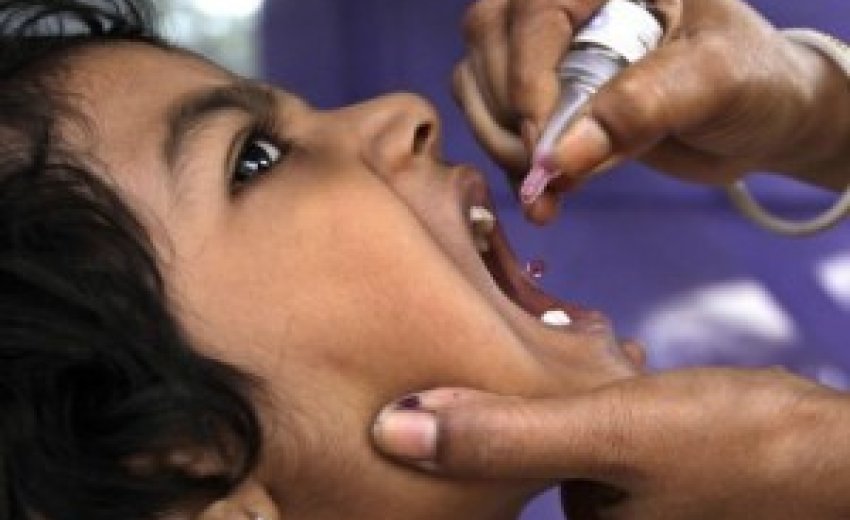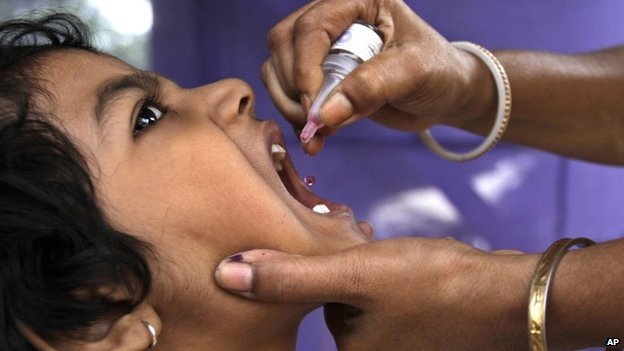 |
| More than 2.4 million volunteers vaccinate some 170 million children in India during every immunisation round |
13 January 2014: India is marking three years since its last reported polio case, a landmark in the global battle against the disease.
It is seen as confirmation of one of India's biggest public health successes, achieved through a massive and sustained immunisation programme.
India's health minister hailed it as a "monumental milestone".
In 2012 the World Health Organisation (WHO) removed India from the list of polio-endemic countries. Pakistan, Afghanistan and Nigeria remain on it.
The list refers to countries in which the virus is circulating freely and the transmission of the infectious disease has not been stopped.
Despite India's success, health experts fear a resurgence of polio in other parts of the world.
Last case
"This monumental milestone was possible due to unwavering political will at the highest level, commitment of adequate financial resources, technological innovation ... and the tireless efforts of millions of workers including more than 23 lakh (2.3 million) vaccinators," Health Minister Ghulam Nabi Azad told reporters.
The WHO is expected to formally certify India's polio-free status next month after testing its last samples.
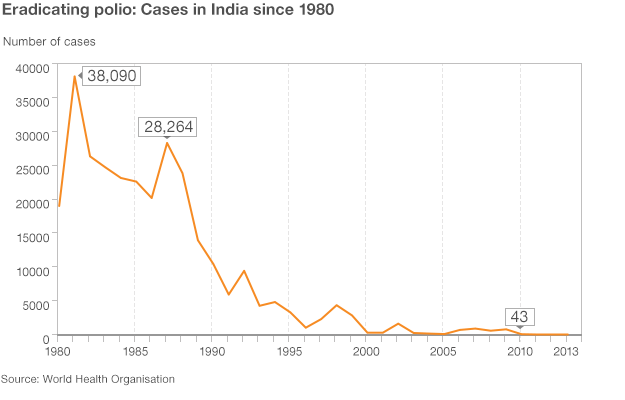
"India has now set other important public health goals as a result of the confidence that the country has got from the successful eradication of polio," the WHO's Hamid Jafari told AFP news agency, citing a new goal to eradicate measles.
Only one case of polio was recorded in India in 2011, down from 741 in 2009. It came from the eastern state of West Bengal in 2011 when an 18-month-old girl was found to have contracted the disease.
Rukshar Khatoon is now going to school and leads a "normal life" although she still suffers pain in her right leg, her doctors and parents told AFP.
"She can now stand on her feet and walk, but can't run. When her friends play, she remains a spectator," her father Abdul Shah said.
|
Polio's last stand? 2012 cases |
* Polio is considered "non-endemic" in Chad |
After the eradication of smallpox in 1980, polio is the second disease in India that has been eliminated through immunisation.
Nearly 2.3 million volunteers vaccinate some 170 million children under five years of age in India during every round of immunisation.
Polio is capable of causing crippling disability or death within hours. It plagued societies in ancient times - and was present in more than 100 countries even in the 1980s, when it left 350,000 people paralysed each year.
Global cases have decreased since then as part of a mass eradication programme - to 372 last year.
Despite the quarter-century-long vaccination programme, experts fear it could make a comeback in countries riven by fighting.
Most of last year's cases were in conflict areas like Somalia and Syria, where polio had previously been eradicated.
Polio immunisation efforts have also been suspended in parts of Pakistan, where it has never been eliminated, because of attacks by militants who see the campaign as a Western plot.
BBC correspondents say unless immunisation is re-started promptly, polio could infect more children, with a risk it could spread beyond Pakistan's borders to India.
But Hamid Jafari at the WHO stressed polio cases were still falling in endemic countries.
"If the current trends of progress continue we could very easily see the end of polio in Afghanistan and Nigeria in 2014."
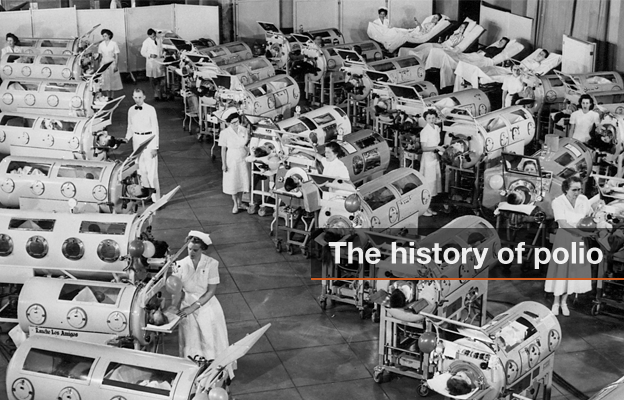 |
| The history of Polio Poliomyelitis has existed as long as human society, but became a major public health issue in late Victorian times with major epidemics in Europe and the United States. The disease, which causes spinal and respiratory paralysis, can kill and remains incurable but vaccines have assisted in its almost total eradication today. |
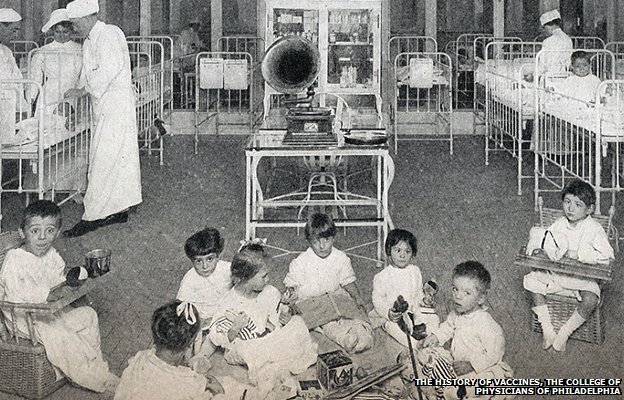 |
| In 1916, New York experienced the first large epidemic, with more than 9,000 cases and 2,343 deaths. The 1916 toll nationwide was 27,000 cases and 6,000 deaths. Children were particularly affected; the image shows child patients suffering from eye paralysis. Major outbreaks became more frequent during the century: in 1952, the US saw a record 57,628 cases. |
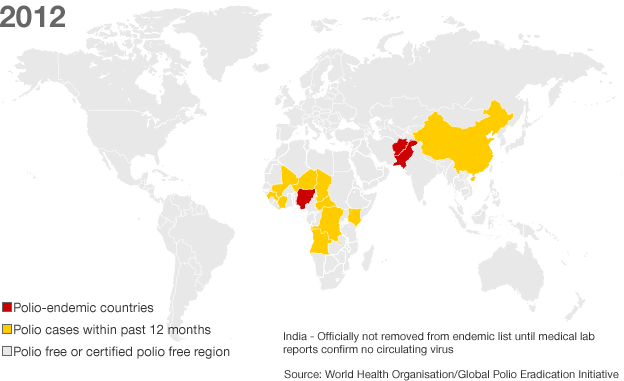 |
| In 2012, Polio remains officially endemic in four countries - Afghanistan, Nigeria, Pakistan and India, which is on the verge of being removed from the list having not had a case since January 2011. Despite so much progress, polio remains a risk with virus from Pakistan re-infecting China in 2011, which had been polio free for more than a decade. ......more |
---------------------------------
Related Article:
Global polio fight reaches milestone as India frees itself of the virus - WHO
By Nita Bhalla
http://www.trust.org/item/20140113080329-0mx7n
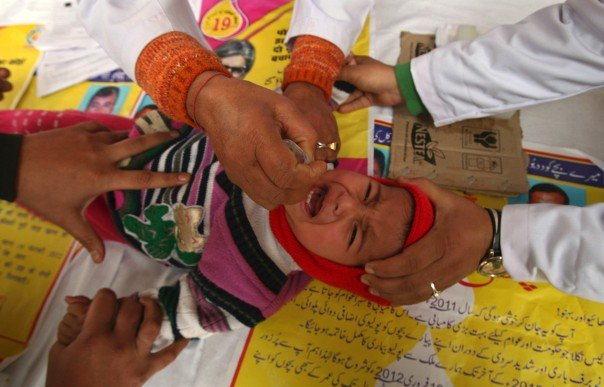 |
| A child receives polio drops during a polio eradication programme in Jammu, on Feb. 19, 2012. The polio eradication programme in India aims to immunise every child under five years of age with the oral polio vaccine. REUTERS/Mukesh Gupta |
Source: Thomson Reuters Foundation
Mon, 13 Jan 2014: NEW DELHI (Thomson Reuters Foundation) - India on Monday marked three years since its last reported case of polio, paving the way for it to be declared free of the crippling virus and giving impetus to efforts to eradicate the disease globally, the World Health Organisation (WHO) said.
The last case of the wild polio virus was detected on Jan. 13, 2011, in a 2-year-old girl in India's West Bengal state. Three years without any new cases means India can be declared polio-free, leaving the virus endemic in only Afghanistan, Pakistan and Nigeria - down from more than 125 polio-endemic countries in 1988.
“We give huge credit to the government… it makes us extremely proud and highly responsible for having helped the government to reach this incredible achievement,” Nata Menabde, the WHO's head in India, told the Thomson Reuters Foundation in an interview.
“It has given confidence to donors, it has given confidence to and (put pressure on) governments of polio-endemic countries, and it has demonstrated that persistent efforts can make a difference.”
.... more
